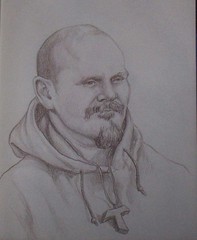Monday, March 06, 2006
The Surprise of the Millenium!
 What's the big news today? Crash won the Oscar? It'll be in the 50's in West Michigan this week? No. The big news that I read today is that Pope Benedict has opened the philosophical and dogmatic door for women to take "roles of leadership" in the Catholic Church. He hasn't actually come out and say that the Church will start ordaining female priests, but in an organization that took 400+ years to apologize for calling Galileo a heretic, this is a move in the right direction. Here's the full article in the Washington Post (commentary follows):
What's the big news today? Crash won the Oscar? It'll be in the 50's in West Michigan this week? No. The big news that I read today is that Pope Benedict has opened the philosophical and dogmatic door for women to take "roles of leadership" in the Catholic Church. He hasn't actually come out and say that the Church will start ordaining female priests, but in an organization that took 400+ years to apologize for calling Galileo a heretic, this is a move in the right direction. Here's the full article in the Washington Post (commentary follows):--------------------------------------------------------

Pope Indicates Openness to Greater Role for Women
Reuters
Friday, March 3, 2006; 9:03 AM
VATICAN CITY (Reuters) - Pope Benedict has indicated that women might be allowed to have positions of greater responsibility in the ministry of the Catholic Church but reaffirmed that they could not become priests.
The Pope's comments were found in a transcript released by the Vatican on Friday, a day after he made them in a closed-door meeting with priests from the Rome diocese.
Weekly Roundup
During the meeting, which took the form of a question and answer session, a priest asked why the Church could not let women have more "governing" roles.
In the conclusion part of his answer, the Pope said: "Nevertheless, it is right to ask oneself if more space, more positions of responsibility, can be given to women, even in the ministerial services ...."
The Pope did not elaborate on types of positions women could hold in the Church or in its governance.
Women's groups have for years been asking for more positions of responsibility in the Vatican departments, where nearly all positions of power are held by men. But the Pope made clear that there could be no change in the Church's ban on women priests. The Church teaches that it cannot ordain women as priests because Christ willingly chose only men as his disciples.
Those in favor of a female priesthood say Christ was only acting according to the social norms of his times.
The late Pope John Paul was adamant on the issue, saying the Church did not have and never would have the authority to change the rule against women priests.
In his response the pope listed well-known women, including Mother Teresa of Calcutta and several women saints, whom he said had served the Church with distinction.
-------------------------------------------------
To me, there is a much more interesting, more mystical thing going on here than just the church's overdue recognition of the holiness of women and the understanding that the female human is just as inherently holy as the male. As wonderful and righteous as this is, the more interesting thing is to see the power of The Christ and the Holy Spirit at work in the Papal throne.
Cardinal Ratzinger, while serving in his roll as Prefect of the Congregation for the Doctrine of the Faith (essentially the modern manifestation of High Inquisitor), became the scourge of mystical theology, excommunicating brilliant liberal theologians such as Matthew Fox and closing the debate to new, mystical, and ecstatic readings of scripture. While this announcement about women doesn't liberate him fully from these past decisions, it proves to me once again that the ways of God and the Spirit are mysterious and beautiful.
Most liberally minded theologians, myself included, felt that the choice of Ratzinger as Pontiff was a reactionary one. It was believed that this decision would finally roll back the last of the forward momentum of liberalism created by Vatican II, which had been loosing ground step-by-step since John Paul II's coronation. However, there is a firm belief within the Catholic Faith that it is not the college of cardinals, but the Holy Spirit itself which chooses the Pope, and when that choice is made, The Christ takes some form of residence in the newly crowned Pontiff.
Popes have often surprised the college of cardinals and the world by chaining their "votes" on long-held ideas or beliefs after being coronated. This has historically been held as a function of the Holy Spirit in their new lives, and is one of the major symbolic reasons that the Popes take new names when they take office. A most recent surprise such as this occurred with the father of Vatican II, Pope John XXIII. When elected, the college thought they were getting an old, conservative, "transitional" Pope. What they got instead was a revolutionary who sought to bring a new life to the Catholic faith. While I cannot say that I agree wholeheartedly with the changes of Vatican II (I am a firm lover of the Latin Mass and the sacredness of its rituals), I believe that without those reforms, people such as Matthew Fox or Andrew Greely or Brother Wayne Teasdale wouldn't have even begun to speak, and we would never have had their ideas in the cultural dialogue.
I hope, I pray that our new Benedict XVI is perhaps beginning a journey of transformation which allows him to keep the things that made John Paul II great (diplomacy, peacemaking, increasing Catholic visibility), while moving into the new millennium with a sense of future and momentum rather than running from new ideas and positive changes which foster equality (a female-friendly and MARRIED priesthood).
